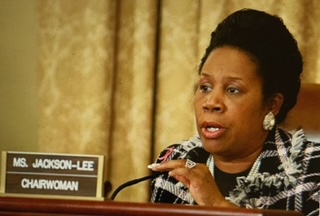By Talib I. Karim
On July 19, 2024, we lost a giant in the fight for justice: Congresswoman Sheila Jackson Lee. Her relentless dedication led to the legislation that made Juneteenth a federal holiday, further cementing her legacy of advocating for justice and equality. Congresswoman Lee chaired the Judiciary Subcommittee on Crime, Terrorism, and Homeland Security, and the Homeland Security Subcommittee on Transportation Security and Infrastructure Protection. She also chaired the multimillion-dollar Congressional Black Caucus Foundation.
Congresswoman Jackson Lee was a tireless champion for her diverse constituency and a beacon of servant leadership.
I arrived in Washington, D.C. in 1990, after leaving the U.S. Air Force Academy to complete my engineering and legal studies. I landed my first Capitol Hill job with the help of Congressman Harold Ford Sr., as an intern in the office of his CBC colleague and California’s first known African American Lt. Governor, Congressman Mervyn Dymally.
Since then, my work on and off Capitol Hill has been significant. Yet, none of my experiences have been more memorable and impactful than my tenure as Chief Technology Counsel and Legislative Director for Congresswoman Sheila Jackson Lee.
My very first assignment was drafting the Congresswoman’s statement introducing General Charles Bolden at the start of his Senate confirmation to become the first African American permanent NASA Administrator. This was a wonderful opportunity as General Bolden along with Guy Buford, and Fred Gregory (who once served as NASA Interim Administrator) were my childhood heroes and fueled my own dreams of following in their shoes as an astronaut.
As Legislative Director, I also helped the Congresswoman championed reforms of the nation’s healthcare system during the adoption of President Obama’s Affordable Care Act. As chair of the Congressional Progressive Caucus’ Health Task Force, our office was at the forefront of advocating for the most progressive elements of the legislation. We mobilized support for Congressman Conyers’ proposed Health Care for All legislation, organized town halls, brain trusts, and listening sessions, and ultimately secured community health center funding. We opposed provisions that would have restricted doctors from owning their hospitals, pushed for expanded Medicaid coverage, and fought against the punitive tax, which was ultimately ruled as unconstitutional, that disproportionately affected African Americans and the poor.
Our office also tackled the disparity between crack and powder cocaine penalties, successfully reducing the ratio from 500:1 to 18:1. We led initiatives on concussion injuries in the NFL, meeting with legends like Jim Brown and questioning the NFLPA president.
My role extended to oversight hearings of the Justice Department, including personal meetings with Attorney General Eric Holder.
The Congresswoman represented a diverse constituency, from the homeless and inmates to oil executives and celebrities. One of the honors of my experience was drafting the congressional proclamation for Michael Jackson. Despite controversies, her bold and diverse hires reflected her fearless leadership style. She recruited military veterans, activists, and professionals from various backgrounds, including Muslims, Arabs, Latinos, Ethiopians, Southern Conservative Christians, and Jews.
The demanding nature of her office was exemplified by a New Year’s Eve call ensuring a speech was ready. This environment fostered loyalty and dedication among her staff, affectionately known as Team SJL. The Congresswoman’s mentorship opened doors for many, with alumni becoming tech executives, industry leaders, and advocates. Some of her staff have gone on to serve as senior aides in the House, Senate, and for governors.
Immediate predecessors like Arthur Sidney, the late Prof. Greg Berry, and Christina McMorris served respectively as the Chief of Staff for Congressman Hank Johnson and Chief Counsel to Congresswoman Karen Bass. Greg Berry returned to the staff of Representative Jackson Lee until his death two years ago.
Reflecting on these experiences paved the way for my current work leading the development of AI tools for law firms, corporations and government agencies. Additionally, it positioned me to assume the role of champion in my own right, advocating for AI-driven afterschool and summer programs to end youth violence in D.C., Maryland and across the country. And while our policy positions didn’t always align, Congresswoman Jackson Lee gladly lent her star power to support the initiatives of STEM4US, which benefitted the youth.
As we honor her legacy, those she mentored must continue her style of servant leadership, willing to embrace controversy and speak out for justice. Our youth need the firm yet loyal leadership Congresswoman Jackson Lee embodied.
The Quranic passage that inspires me during times of trial is: “And We will surely test you with something of fear and hunger and a loss of wealth and lives and fruits, but give good tidings to the patient, who, when disaster strikes them, say, ‘Indeed we belong to Allah, and indeed to Him we will return.’” (Quran 2:155-156).
Long live the memory and legacy of fearless servant leadership embodied by Sheila Jackson Lee. Her work and impact will continue to inspire those committed to justice and equity. In the spirit of her unwavering dedication, we continue to strive for a future where technology and justice work hand in hand to create a more equitable society.
The post Championing justice: Reflections on serving Congresswoman Sheila Jackson Lee appeared first on AFRO American Newspapers.











